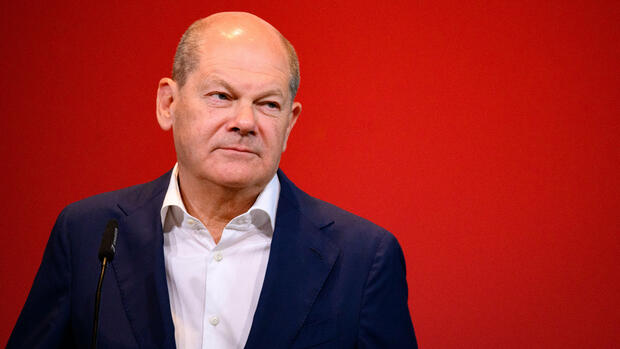Uncertainty among citizens brings “resonance for parties that praise the past in a bad mood”.
(Photo: dpa)
Berlin In another survey, the AfD can draw level with the Chancellor’s Party SPD. According to a survey by the opinion research institute Insa for the “Bild am Sonntag”, the party, which the constitutional protection agency classifies as a suspected right-wing extremist, could get 19 percent (+1) of the votes if there were federal elections this Sunday.
That is one percentage point more than in the previous week, ten percentage points more than a year ago and the highest value that a polling institute has so far measured for the AfD. Just as many respondents would therefore choose SPD, which lost one percentage point compared to the previous week.
The CDU and CSU also lose one percentage point, but are still clearly ahead at 27 percent. Greens and FDP remain unchanged compared to the previous week at 13 and nine percent.
The left can gain a point, is now back to five percent and would thus make it back into parliament. The other parties could unite eight percent of the votes.
The opinion research institute Insa asked a total of 1205 people for the survey between May 30 and June 2, 2023. The exact question was: “If there were a federal election next Sunday, how would you vote?” The maximum error tolerance is +/ – 2.9 percentage points.
In the most recent ARD “Germany trend” the AfD was even with the SPD – to 18 percent. Since then, there has been an intensified debate about the causes of the survey high.
Scholz: “Bad mood party” like AfD benefits from uncertainty
Chancellor Olaf Scholz (SPD) sees the uncertainty in times of crisis as the reason for the AfD’s soaring polls. Also in view of the success of right-wing populist parties in other European countries, the question “Why are there such bad mood parties?” he said on Saturday evening at the event “Lange Nacht der Zeit” in Hamburg.
“We live in a time of upheaval in which many citizens in our countries are not so sure whether the future is on their side and whether they have one,” Scholz continued. This creates uncertainty “and resonance for parties that praise the past in a bad mood”.
To counter the populists, “we must ensure that Europe, that our countries, have a future to believe in”. Last but not least, it is about the question of “what holds a society together. The issue of respect,” said the Chancellor. “If we don’t manage to feel equal” for different career and life paths in a society that has become more open, “then we will have a lot of resonance space for the Trumpists, the Brexiteers or for the AfD”.
CDU leader Merz: “Traffic light nourishes AfD“
CDU leader Friedrich Merz reacted to the latest survey results with a declaration of war on the AfD and sharp criticism of the traffic light coalition. “On closer inspection, the causes have been pretty clear for a long time,” he wrote in his “MerzMail” newsletter on Saturday. “A weak and constantly quarreling government triggers backlash. With the AfD, the citizens can miss out on serious reminders.”
These reminders are currently affecting the Greens in particular, who meanwhile only reach their own clientele, “but outside of them they encounter particularly strong resistance with their obtrusively presented public education attitude”. When “ordinary citizens” are no longer heard by the governing parties, they turn to those who are particularly sharply opposed to it.
When asked why his party was not benefiting from the situation, Merz wrote that the CDU was held jointly responsible for the state of the country and that if they took counter-positions to the coalition, they were the same ones who constantly asked for alternatives, “at lightning speed with the racism club and the “shift to the right” accusation at hand”. “Such a narrowing of the climate of opinion only pays into the AfD, and so the traffic light nourishes this party twice over.”
Don’t let yourself be frightened by a “narrow-minded opinion elite,” wrote Merz. He also made it clear that the strengthening of the AfD was not simply accepted. “We stand up for our convictions with joy, optimism and the willingness to stand up at any time to anyone who wants to make a different country out of Germany, be it from the far left or the far right.”
CDU General Secretary Mario Czaja, among others, had previously attributed this to the uncertainty caused by the policy of the traffic light coalition in the federal government.
Green leader Ricarda Lang tweeted on Saturday: “Instead of pointing the finger at others and monocausally assigning blame, all democratic parties should, together, consider what effective strategies against the AfD look like.”
Malu Dreyer: CDU reaction to AfD survey high is “hypocritical”
The Rhineland-Palatinate Prime Minister Malu Dreyer (SPD) also criticized the reaction of the CDU. “I am stunned by how hypocritical and unabashed the Union is looking for the reasons for the AfD’s high polls among others,” Dreyer told the dpa news agency in Mainz on Saturday.
Dreyer said the AfD’s poll numbers had been this high before. “That was in the summer of 2018, when the Union sister parties CDU and CSU fought such a bitter asylum dispute, heating up the mood among the population and risking a break in the government, when the former CDU President for the Protection of the Constitution, Hans-Georg Maaßen, downplayed violent excesses by a right-wing mob in Chemnitz and Markus Söder denounced an alleged asylum tourism.
The pattern is now the same again, said Dreyer: “First cheer on the mood among the population and then ask who can put out the fire.”
More: The wrong chancellor – he delivers on foreign policy, but he blunders on the inside. A comment.
